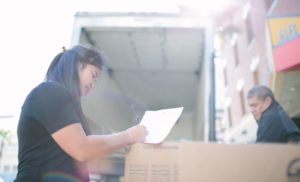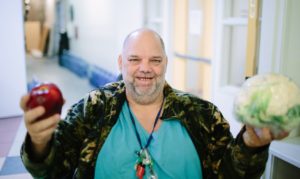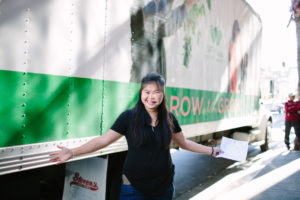The distinctive green-and-white Food Bank truck pulls up to the Bayanihan House, a single-room-occupancy hotel for low-income residents in San Francisco’s SOMA neighborhood. It’s a warmer-than-usual morning, and Pantry Coordinator Lizzy is outside, in short sleeves, ready to work.
She busies herself with the fresh groceries just delivered by the Food Bank, going item by item as driver, Soni Huanga, unloads multiple pallets of food. The chicken, fresh produce, and hearty grains on these pallets will feed dozens of people at the weekly food pantry at Bayanihan House.

“Look at those pears!” Lizzy exclaims, excited by the bounty of food that has just arrived. “We have heads of lettuce. And bags and bags of rice – those will be gone soon.”
Lizzy moves with a distinct confidence, like she’s been doing this kind of work in the community for years. In reality, this is her first job since she graduated college a year ago.
“I took the job because I realized that connecting people to food is central for them to feel loved for who they are,” Lizzy says.
That’s not lost on the residents of Bayanihan House, who rely on nutritious food from the pantry every week and look forward to connecting with Lizzy.
“Lizzy does a great job of making people feel comfortable,” says Keith, who lives in the building and not only volunteers at the weekly pantry, but also accesses his weekly groceries there. “You can see how happy people are when they come here on pantry day.”

Keith, like most residents of Bayanihan House, lives below the federal poverty level, making shopping at a grocery store a very rare event. He receives just $900 dollars a month in SSI payments. SSI is the federal income supplement program for low income seniors and disabled people that provides cash to meet basic needs of food, clothing, and shelter.
“Once I pay my rent, I usually have just a few bucks left over – not a lot to buy and eat healthy food,” Keith says. “Thankfully, we have the pantry. I really don’t know what I, or other people, would do without it.”
For Lizzy, providing food is not just about filling bellies – it’s about providing high-quality nutrition and dignity to people who have faced many life challenges.

“Access to good food takes away the stigma of having a disability, mental illness, or being old,” Lizzy says. “It gives people agency; they can cook for themselves, and oftentimes they share the recipes they make with food from the pantry. They also enjoy cooking together and sharing some of the meals they make.”
If you would like to help us provide food at pantries like the Bayanihan House and help occupants be healthier and happier, please consider a donation to the Food Bank today.


Share